2002 CHEVROLET AVEO brake
[x] Cancel search: brakePage 2092 of 5127
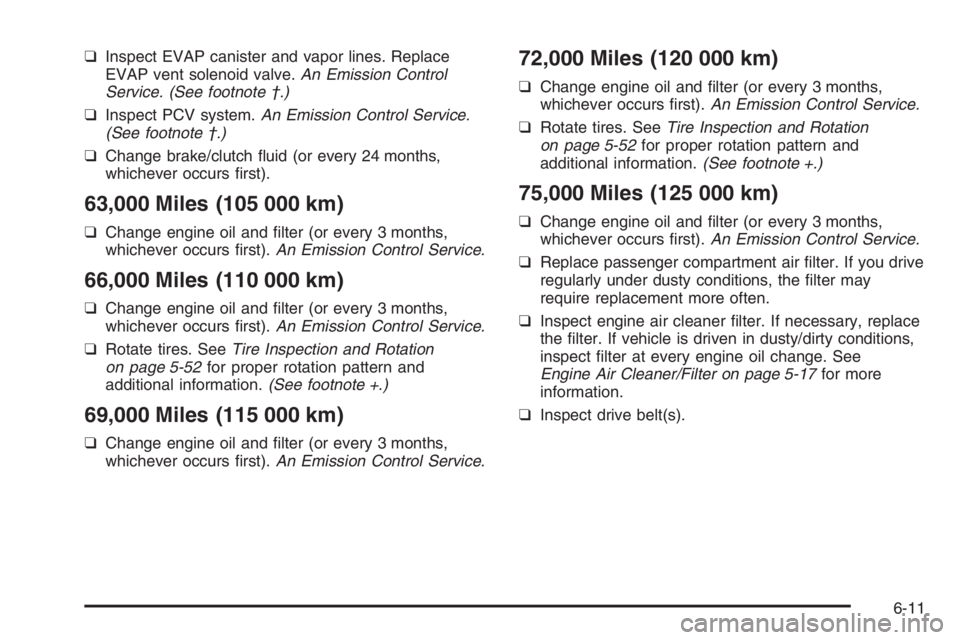
❑ Inspect EVAP canister and vapor lines. Replace
EVAP vent solenoid valve. An Emission Control
Service. (See footnote †.)
❑ Inspect PCV system. An Emission Control Service.
(See footnote †.)
❑ Change brake/clutch fluid (or every 24 months,
whichever occurs first).
63,000 Miles (105 000 km)
❑ Change engine oil and filter (or every 3 months,
whichever occurs first). An Emission Control Service.
66,000 Miles (110 000 km)
❑Change engine oil and filter (or every 3 months,
whichever occurs first). An Emission Control Service.
❑ Rotate tires. See Tire Inspection and Rotation
on page 5-52 for proper rotation pattern and
additional information. (See footnote +.)
69,000 Miles (115 000 km)
❑Change engine oil and filter (or every 3 months,
whichever occurs first). An Emission Control Service.
72,000 Miles (120 000 km)
❑Change engine oil and filter (or every 3 months,
whichever occurs first). An Emission Control Service.
❑ Rotate tires. See Tire Inspection and Rotation
on page 5-52 for proper rotation pattern and
additional information. (See footnote +.)
75,000 Miles (125 000 km)
❑Change engine oil and filter (or every 3 months,
whichever occurs first). An Emission Control Service.
❑ Replace passenger compartment air filter. If you drive
regularly under dusty conditions, the filter may
require replacement more often.
❑ Inspect engine air cleaner filter. If necessary, replace
the filter. If vehicle is driven in dusty/dirty conditions,
inspect filter at every engine oil change. See
Engine Air Cleaner/Filter on page 5-17 for more
information.
❑ Inspect drive belt(s).
6-11
Page 2094 of 5127
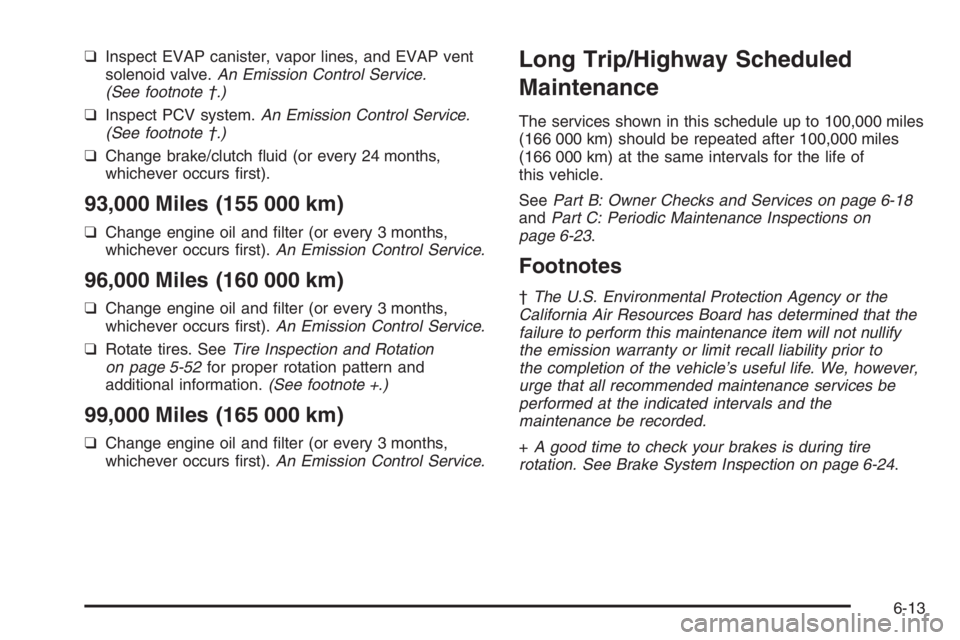
❑ Inspect EVAP canister, vapor lines, and EVAP vent
solenoid valve. An Emission Control Service.
(See footnote †.)
❑ Inspect PCV system. An Emission Control Service.
(See footnote †.)
❑ Change brake/clutch fluid (or every 24 months,
whichever occurs first).
93,000 Miles (155 000 km)
❑ Change engine oil and filter (or every 3 months,
whichever occurs first). An Emission Control Service.
96,000 Miles (160 000 km)
❑Change engine oil and filter (or every 3 months,
whichever occurs first). An Emission Control Service.
❑ Rotate tires. See Tire Inspection and Rotation
on page 5-52 for proper rotation pattern and
additional information. (See footnote +.)
99,000 Miles (165 000 km)
❑Change engine oil and filter (or every 3 months,
whichever occurs first). An Emission Control Service.
Long Trip/Highway Scheduled
Maintenance
The services shown in this schedule up to 100,000 miles
(166 000 km) should be repeated after 100,000 miles
(166 000 km) at the same intervals for the life of
this vehicle.
See Part B: Owner Checks and Services on page 6-18
and Part C: Periodic Maintenance Inspections on
page 6-23 .
Footnotes
†The U.S. Environmental Protection Agency or the
California Air Resources Board has determined that the
failure to perform this maintenance item will not nullify
the emission warranty or limit recall liability prior to
the completion of the vehicle’s useful life. We, however,
urge that all recommended maintenance services be
performed at the indicated intervals and the
maintenance be recorded.
+ A good time to check your brakes is during tire
rotation. See Brake System Inspection on page 6-24 .
6-13
Page 2096 of 5127
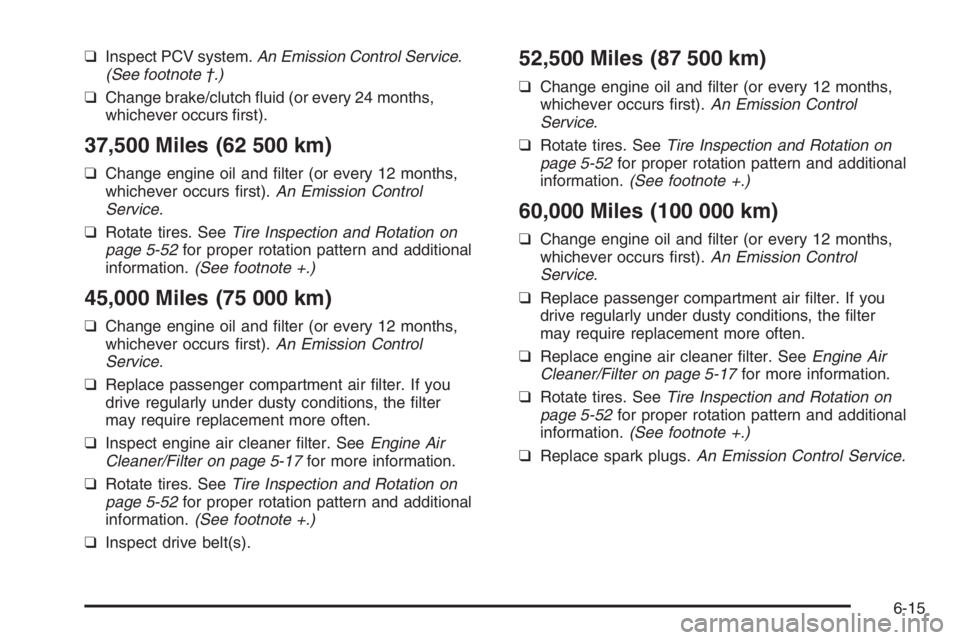
❑ Inspect PCV system. An Emission Control Service.
(See footnote †.)
❑ Change brake/clutch fluid (or every 24 months,
whichever occurs first).
37,500 Miles (62 500 km)
❑ Change engine oil and filter (or every 12 months,
whichever occurs first). An Emission Control
Service.
❑ Rotate tires. See Tire Inspection and Rotation on
page 5-52 for proper rotation pattern and additional
information. (See footnote +.)
45,000 Miles (75 000 km)
❑Change engine oil and filter (or every 12 months,
whichever occurs first). An Emission Control
Service.
❑ Replace passenger compartment air filter. If you
drive regularly under dusty conditions, the filter
may require replacement more often.
❑ Inspect engine air cleaner filter. See Engine Air
Cleaner/Filter on page 5-17 for more information.
❑ Rotate tires. See Tire Inspection and Rotation on
page 5-52 for proper rotation pattern and additional
information. (See footnote +.)
❑ Inspect drive belt(s).
52,500 Miles (87 500 km)
❑Change engine oil and filter (or every 12 months,
whichever occurs first). An Emission Control
Service.
❑ Rotate tires. See Tire Inspection and Rotation on
page 5-52 for proper rotation pattern and additional
information. (See footnote +.)
60,000 Miles (100 000 km)
❑Change engine oil and filter (or every 12 months,
whichever occurs first). An Emission Control
Service.
❑ Replace passenger compartment air filter. If you
drive regularly under dusty conditions, the filter
may require replacement more often.
❑ Replace engine air cleaner filter. See Engine Air
Cleaner/Filter on page 5-17 for more information.
❑ Rotate tires. See Tire Inspection and Rotation on
page 5-52 for proper rotation pattern and additional
information. (See footnote +.)
❑ Replace spark plugs. An Emission Control Service.
6-15
Page 2097 of 5127
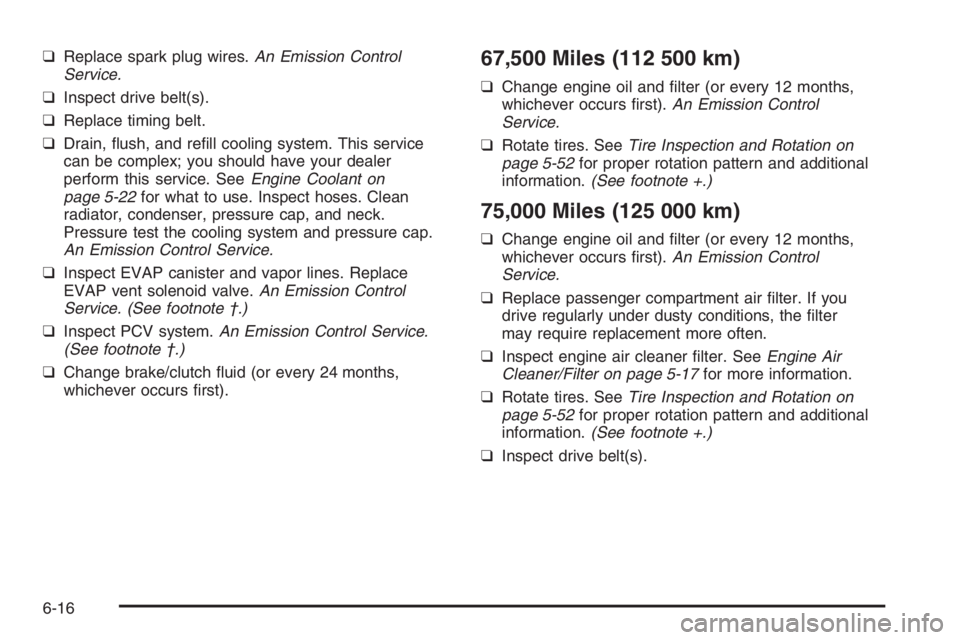
❑ Replace spark plug wires. An Emission Control
Service.
❑ Inspect drive belt(s).
❑ Replace timing belt.
❑ Drain, flush, and refill cooling system. This service
can be complex; you should have your dealer
perform this service. See Engine Coolant on
page 5-22 for what to use. Inspect hoses. Clean
radiator, condenser, pressure cap, and neck.
Pressure test the cooling system and pressure cap.
An Emission Control Service.
❑ Inspect EVAP canister and vapor lines. Replace
EVAP vent solenoid valve. An Emission Control
Service. (See footnote †.)
❑ Inspect PCV system. An Emission Control Service.
(See footnote †.)
❑ Change brake/clutch fluid (or every 24 months,
whichever occurs first).67,500 Miles (112 500 km)
❑ Change engine oil and filter (or every 12 months,
whichever occurs first). An Emission Control
Service.
❑ Rotate tires. See Tire Inspection and Rotation on
page 5-52 for proper rotation pattern and additional
information. (See footnote +.)
75,000 Miles (125 000 km)
❑Change engine oil and filter (or every 12 months,
whichever occurs first). An Emission Control
Service.
❑ Replace passenger compartment air filter. If you
drive regularly under dusty conditions, the filter
may require replacement more often.
❑ Inspect engine air cleaner filter. See Engine Air
Cleaner/Filter on page 5-17 for more information.
❑ Rotate tires. See Tire Inspection and Rotation on
page 5-52 for proper rotation pattern and additional
information. (See footnote +.)
❑ Inspect drive belt(s).
6-16
Page 2098 of 5127
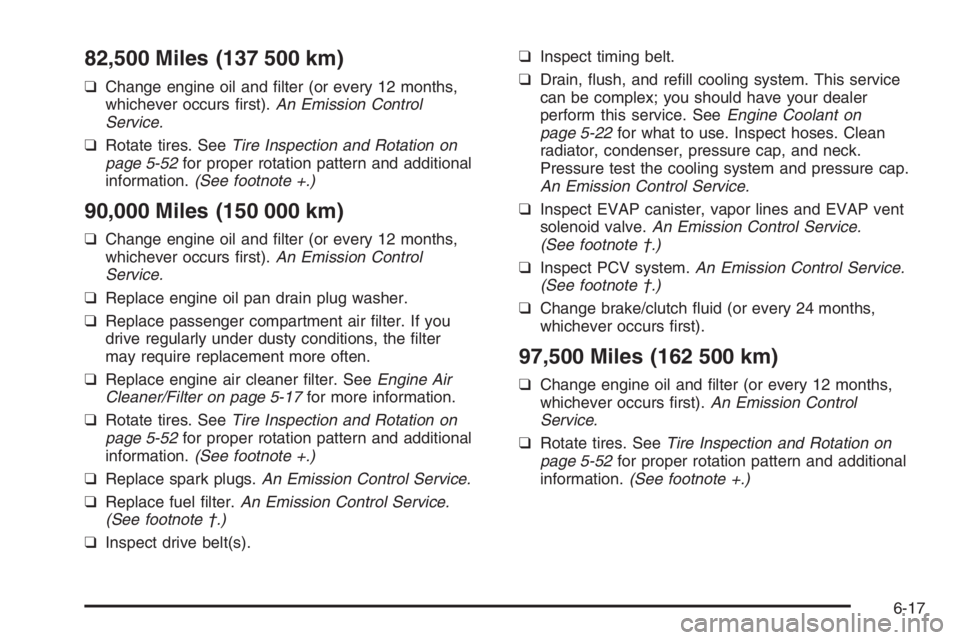
82,500 Miles (137 500 km)
❑ Change engine oil and filter (or every 12 months,
whichever occurs first). An Emission Control
Service.
❑ Rotate tires. See Tire Inspection and Rotation on
page 5-52 for proper rotation pattern and additional
information. (See footnote +.)
90,000 Miles (150 000 km)
❑Change engine oil and filter (or every 12 months,
whichever occurs first). An Emission Control
Service.
❑ Replace engine oil pan drain plug washer.
❑ Replace passenger compartment air filter. If you
drive regularly under dusty conditions, the filter
may require replacement more often.
❑ Replace engine air cleaner filter. See Engine Air
Cleaner/Filter on page 5-17 for more information.
❑ Rotate tires. See Tire Inspection and Rotation on
page 5-52 for proper rotation pattern and additional
information. (See footnote +.)
❑ Replace spark plugs. An Emission Control Service.
❑ Replace fuel filter. An Emission Control Service.
(See footnote †.)
❑ Inspect drive belt(s). ❑
Inspect timing belt.
❑ Drain, flush, and refill cooling system. This service
can be complex; you should have your dealer
perform this service. See Engine Coolant on
page 5-22 for what to use. Inspect hoses. Clean
radiator, condenser, pressure cap, and neck.
Pressure test the cooling system and pressure cap.
An Emission Control Service.
❑ Inspect EVAP canister, vapor lines and EVAP vent
solenoid valve. An Emission Control Service.
(See footnote †.)
❑ Inspect PCV system. An Emission Control Service.
(See footnote †.)
❑ Change brake/clutch fluid (or every 24 months,
whichever occurs first).
97,500 Miles (162 500 km)
❑ Change engine oil and filter (or every 12 months,
whichever occurs first). An Emission Control
Service.
❑ Rotate tires. See Tire Inspection and Rotation on
page 5-52 for proper rotation pattern and additional
information. (See footnote +.)
6-17
Page 2100 of 5127
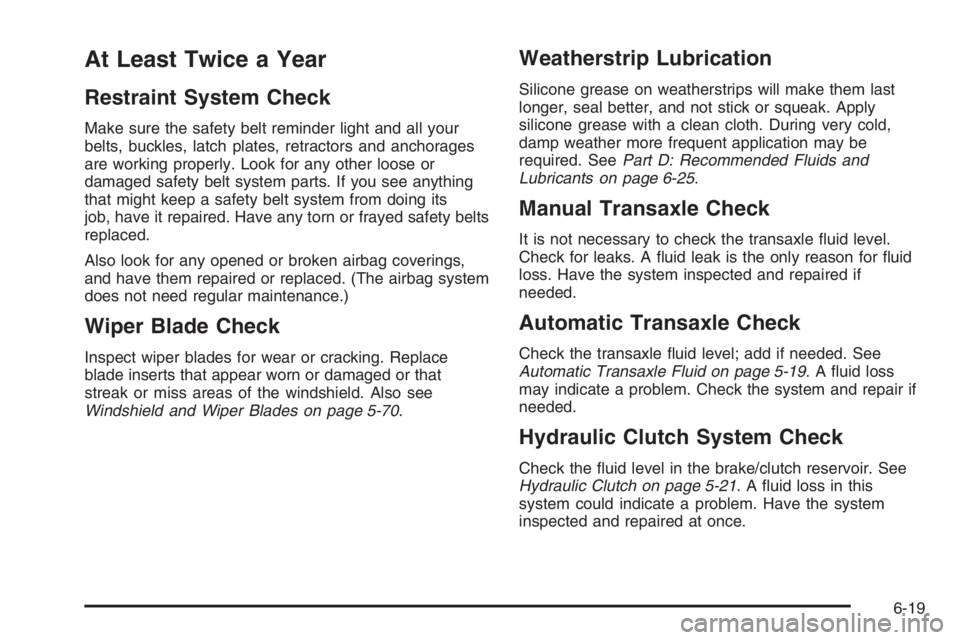
At Least Twice a Year
Restraint System Check
Make sure the safety belt reminder light and all your
belts, buckles, latch plates, retractors and anchorages
are working properly. Look for any other loose or
damaged safety belt system parts. If you see anything
that might keep a safety belt system from doing its
job, have it repaired. Have any torn or frayed safety belts
replaced.
Also look for any opened or broken airbag coverings,
and have them repaired or replaced. (The airbag system
does not need regular maintenance.)
Wiper Blade Check
Inspect wiper blades for wear or cracking. Replace
blade inserts that appear worn or damaged or that
streak or miss areas of the windshield. Also see
Windshield and Wiper Blades on page 5-70.
Weatherstrip Lubrication
Silicone grease on weatherstrips will make them last
longer, seal better, and not stick or squeak. Apply
silicone grease with a clean cloth. During very cold,
damp weather more frequent application may be
required. SeePart D: Recommended Fluids and
Lubricants on page 6-25.
Manual Transaxle Check
It is not necessary to check the transaxle fluid level.
Check for leaks. A fluid leak is the only reason for fluid
loss. Have the system inspected and repaired if
needed.
Automatic Transaxle Check
Check the transaxle fluid level; add if needed. See
Automatic Transaxle Fluid on page 5-19. A fluid loss
may indicate a problem. Check the system and repair if
needed.
Hydraulic Clutch System Check
Check the fluid level in the brake/clutch reservoir. See
Hydraulic Clutch on page 5-21. A fluid loss in this
system could indicate a problem. Have the system
inspected and repaired at once.
6-19
Page 2101 of 5127
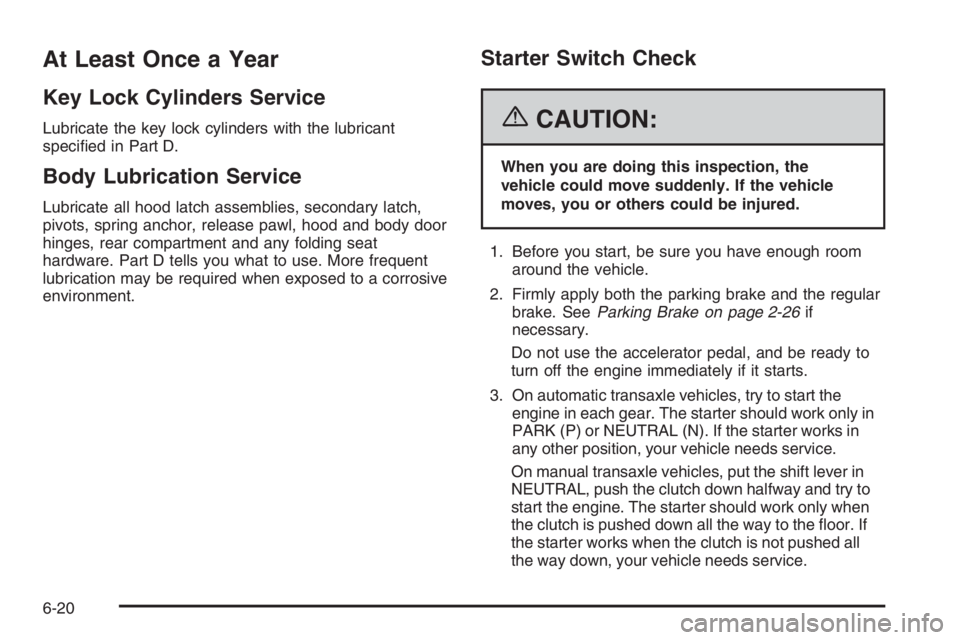
At Least Once a Year
Key Lock Cylinders Service
Lubricate the key lock cylinders with the lubricant
specified in Part D.
Body Lubrication Service
Lubricate all hood latch assemblies, secondary latch,
pivots, spring anchor, release pawl, hood and body door
hinges, rear compartment and any folding seat
hardware. Part D tells you what to use. More frequent
lubrication may be required when exposed to a corrosive
environment.
Starter Switch Check
{CAUTION:
When you are doing this inspection, the
vehicle could move suddenly. If the vehicle
moves, you or others could be injured.
1. Before you start, be sure you have enough room
around the vehicle.
2. Firmly apply both the parking brake and the regular
brake. SeeParking Brake on page 2-26if
necessary.
Do not use the accelerator pedal, and be ready to
turn off the engine immediately if it starts.
3. On automatic transaxle vehicles, try to start the
engine in each gear. The starter should work only in
PARK (P) or NEUTRAL (N). If the starter works in
any other position, your vehicle needs service.
On manual transaxle vehicles, put the shift lever in
NEUTRAL, push the clutch down halfway and try to
start the engine. The starter should work only when
the clutch is pushed down all the way to the floor. If
the starter works when the clutch is not pushed all
the way down, your vehicle needs service.
6-20
Page 2102 of 5127

Automatic Transaxle Shift Lock Control
System Check
{CAUTION:
When you are doing this inspection, the
vehicle could move suddenly. If the vehicle
moves, you or others could be injured.
1. Before you start, be sure you have enough room
around the vehicle. It should be parked on a level
surface.
2. Firmly apply the parking brake. SeeParking Brake
on page 2-26if necessary.
Be ready to apply the regular brake immediately if
the vehicle begins to move.
3. With the engine off, turn the ignition to ON, but do
not start the engine. Without applying the regular
brake, try to move the shift lever out of PARK (P)
with normal effort. If the shift lever moves out
of PARK (P), your vehicle needs service.
Ignition Transaxle Lock Check
While parked, and with the parking brake set, try to turn
the ignition to LOCK in each shift lever position.
•With an automatic transaxle, the ignition should turn
to LOCK only when the shift lever is in PARK (P).
•With a manual transaxle, the ignition should turn to
LOCK only when you press the key release button.
On all vehicles, the key should come out only in LOCK.
Turn the steering wheel to the left and to the right. It
should only lock when turned to the right.
6-21